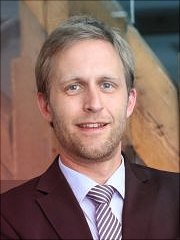Kolloquium WiSe 2019/20

Speaker
Prof. Bjoern Eskofier, PhD
Friedrich-Alexander-Universität Erlangen-Nürnberg
When: Mo, 17.02.2020, at 17:00 c.t.
Where: Room B-201
Topic
Ubiquitous Health:
Wearable Computing Systems that Increase Quality of Life and Transform Health Care
Language: English
Abstract
The fast-growing costs of acute care are pushing the healthcare systems worldwide to a limit. Globally, we are coming to realize that we cannot afford to provide everybody with access to unlimited healthcare services in the light of current demographic changes. An alternative approach is emerging that focuses on “keeping people healthy” through primary and secondary prevention in all phases of life. This paradigm shift in the healthcare systems is demanding research in ambient, sensor-enhanced assistive technologies that “keep people outside of the hospital”. Therefore, a fast-growing interest exists for wearable and pervasive computing systems and ambient assistive technology that aim at ubiquitous health support for individuals in the home and community settings.
The talk will present research projects (c.f. Fig. 1) where we implemented ambient sensors for physiological and biomechanical data recording, used pervasive computing systems for monitoring and signal processing, and employed machine learning algorithms and simulation models in order to provide accurate information to patients and caregivers in neurological and musculoskeletal movement disorders with the aim of promoting quality of life of patients and improving health care.
As a model disease for technology development, Parkinson’s disease (PD) will be presented. Routinely assessed by observation, the disease’s symptoms are rated as part of semiquantitative clinical scores. In an alliance between medicine and engineering, a sensor based gait analysis system that objectively assesses gait patterns in PD was developed. The system provides spatiotemporal gait parameters and was evaluated in PD patients (n=190) and age-matched controls (n=101). Cross-sectional analysis revealed altered gait parameters and variations represented by short steps, shuffling gait, and postural instability in PD patients that were specific for different disease stages. In addition, gait parameters reflecting the progressive nature of PD corresponded to physician ratings of gait impairment over time. These data demonstrated the feasibility and applicability of more objective sensor-based gait measurement in PD for clinical studies and individual patient care.
The outlook of the presentation will focus on future research directions that aim at contributing to the above mentioned paradigm shift in global healthcare systems by the use of wearable and pervasive computing for ubiquitous health support.
Bio
Bjoern M. Eskofier is German Research Foundation (DFG) funded Heisenberg-Professor for "Digital Support Systems in Sports and Medical Engineering" and endowed professor of the Adidas AG. He heads the Machine Learning and Data Analytics (MaD) Lab and the Central Institute for Medical Engineering at the Friedrich-Alexander-University Erlangen-Nuernberg (FAU). Currently, his lab has 30 co-workers, who research in the fields of machine learning and signal analysis for wearable computing systems in sports and health care. The motivation of the lab’s researchers is to increase human wellbeing.
Dr. Eskofier studied Electrical Engineering at the FAU and graduated in 2006. He then studied under the supervision of Prof. Dr. Benno Nigg at the University of Calgary (Canada). There, he received his PhD degree in Biomechanics in 2010 for his research on "Application of Pattern Recognition Methods in Biomechanics". He authored more than 160 peer reviewed articles, submitted 5 patent applications, and started three spinoff startup companies. He won several medical-technical research awards. In 2016, he was a visiting professor in Dr. Paolo Bonato’s Motion Analysis Lab at Harvard Medical School (February-March), and in 2018, he was a visiting professor in Dr. Alex “Sandy” Pentland’s Human Dynamics group at MIT Media Lab (March-August). He is also a delegate of the FAU to the Medical Valley (80 Mio Euro German Ministry of Education funded cluster) and to the European Institute of Innovation & Technology for Health (EIT Health, 500 Mio Euro EU consortium, 2015-2021).
Bjoern Eskofier has defined his research and entrepreneurial agenda to revolve around contributions to a “Digital Health Ecosystem”, where patients are connected to other stakeholders within the Healthcare system using digital support tools. His digital health research philosophy is that only multidisciplinary teams of engineers, medical experts, industry representatives and entrepreneurs will have the tools to actually implement changes in Healthcare.
Contact
Prof. Dr. Frank Steinicke
Vortrag bei Lecture2Go
(Passwort erhältlich bei Referent, Gastgeber oder Organisationskomitee)
